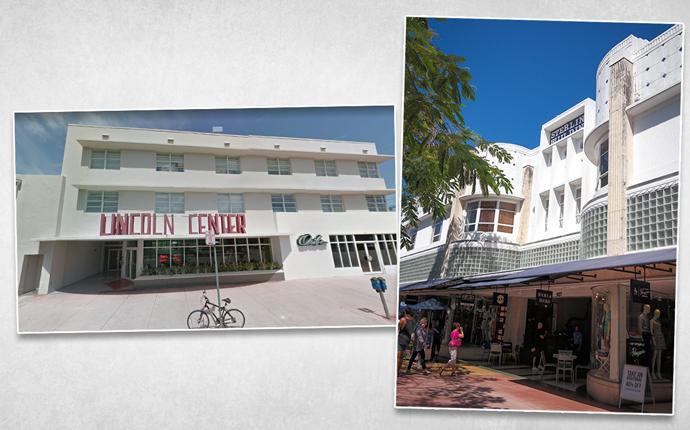Trending
Miami Beach board greenlights new rules for hotel development along Lincoln Road
New rules include waiving parking fee requirements, allowing multi-story rooftop additions, reducing the minimum size of hotel rooms from 335 sf to 200 sf and increasing the height limit on the north side of Lincoln Road between Pennsylvania and Lenox avenues

Hotel development along Lincoln Road is now a step closer to reality.
A proposed ordinance that would make it easier to build hotels along the South Beach pedestrian promenade won the endorsement of the Miami Beach Planning Board on Tuesday.
Two Lincoln Road property owners who want to redevelop their office buildings as hotels pushed for the new rule. They claim that current city regulations dealing with parking regulations, height limits, and the size of hotel rooms have made building hotels on Lincoln Road fiscally impossible.
One of them, Sam Herzberg, owns the 91-year-old Sterling Building at 927 Lincoln Road. Herzberg’s attorney, Michael “Micky” Marrero, told The Real Deal that his client wants zoning that would enable him to start building a 75-foot-tall, 140-room hotel addition, designed by architect Kobi Karp, by 2020.
“They [Herzberg and his partners] have a great project and they have an architect they’re really excited about,” Marrero said.
The other property owner, Mel Schlesser, president of Jameck Development, owns the circa-1935 Lincoln Center complex at 690 Lincoln Road. The property includes a two-story retail building, a courtyard, and a three-story office building.
Monika Entin, Schlesser’s attorney, said that her client wants to build two stories on top of the three-story building and turn that structure back into a hotel, just as it had been prior to the year 2000. Further details on the project are still being worked out.
“We are just looking at the massing and figuring out what will fit and how to preserve the entirety of that historic space,” Entin told TRD, adding that she anticipates that hotel plans, which are being crafted by architecture firms R+O Studio and 10 Design, will be presented to the city sometime next year.
Herzberg and Schlesser both had a hand in crafting the proposed Lincoln Road Hotel Amendments that will waive parking fee requirements, allow multi-story rooftop additions, and reduce the minimum size of hotel rooms from 335 square feet to 200 square feet. It’ll also increase the height limit on the north side of Lincoln Road, between Pennsylvania and Lenox avenues, from 50 feet to 75 feet, a sector where The Sterling building is located. The height limit for the south side of Lincoln Road, which abuts a residential area and is where Lincoln Center is located, will remain at 50 feet.
In exchange, developers will have to make improvements to the alleyways surrounding Lincoln Road— Lincoln Lane North and Lincoln Lane South. Lincoln Road hoteliers will also have to give about $254,000 to a fund that benefits Lincoln Road or art in public spaces, or provide at least 500 square feet to a local non-profit or artisan for “display demonstrations.”
Daniel Ciraldo, executive director of the Miami Design Preservation League, said the idea is to encourage hoteliers to provide the sort of public art spaces that once existed on Lincoln Road, like the Miami City Ballet and the South Florida Arts Center, prior to retail rental rates surpassing $200 a square foot.
Indeed, it’s the desire to bring more restaurants and small shops back to Lincoln Road, as opposed to corporate retailers, that led to support for the Lincoln Road Hotel Amendments from at least three Miami Beach city commissioners, the Lincoln Road Business Improvement District, and Miami Design Preservation League. Planning board member Brian Elias noted that he’s seen a “lot of vacancies” on Lincoln Road lately. Another planning board member, David Wieder, described Lincoln Road as “high-rent blight.”
But Wieder, a one-time mayoral candidate and former chairman of the Miami Beach Historic Preservation Board, feared that the hotel amendments may help kill Lincoln Road and the surrounding historic district instead of saving the area, by encouraging more development, taller buildings, and greater vehicular traffic volumes.
“I’m extremely disturbed and troubled by this slippery slope that we are asked to approve without knowing more details,” Wieder said.
Wieder added that he’d like to have more time, but Mooney replied that the commission would be taking this matter up in September and needed a recommendation now.
Mooney also pointed out that the city code required four affirmative votes from the planning board for a positive recommendation. Only four board members were present, meaning that a single “no” vote would be considered an unfavorable recommendation.
After assurances that potential hotel projects would have to come to the historic preservation board and the planning board for approval, Wieder voted to recommend with the rest of his colleagues, so long as his warning was included in the language: that city boards be “very cautious” and not give “blanket approval” to hoteliers seeking height increases.
Marrero said Herzberg is eager for the ordinance to be passed so that he can move forward with his hotel project.
“We had a [hotel] plan before we had an ordinance,” Marrero told TRD. “We have been evolving the plan with the staff and the commission, and we hope to be before the historic preservation board and the planning board sometime in the fall, if all goes well.”




